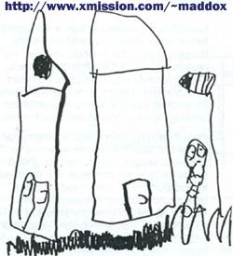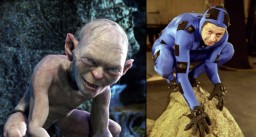The Word Made Flesh: On the Nature Of Book-To-Film Adaptations (Conclusion: The Condemnation of Incarnation)
Friday , 27, February 2015 Uncategorized 6 CommentsIn this series, we’ve looked at the goals, the challenges, and techniques of book-to-film adaptations. Now, to avoid tediousness, the marquee showdown: as a medium, are books inherently better than movies?
Many of the arguments against films are akin to the gnostic condemnations of the incarnation, favoring the immaterial over the material flesh-and-blood image. Thus, I will mostly argue in favor of films, so as to avoid supporting the antichrist.
But, I will begin with compelling pro-book arguments, and film — ever the underdog — will have to defend itself, and make successful counterattacks.
It will fail.
Therefore, at the very end of the essay, I will suddenly reverse myself, throw in the towel, and declare books the victor, so as to secure favor from the literati.
J.R.R. Tolkien sets the stage for this pre-determined battle, with argument number one:
1. Movies, being a visible form of art, are less universal and less poignantly particular than books.
In Tolkien’s own words:
The radical distinction between all art (including drama) that offers a visible presentation and true literature is that it imposes one visible form. Literature works from mind to mind and is thus more progenitive. It is at once more universal and more poignantly particular. If it speak of bread or wine or stone or tree, it appeals to the whole of these things, to their ideas; yet each hearer will give to them a particular embodiment in his imagination. Should the story say, “he ate bread” the dramatic producer or painter can only show “a piece of bread” according to his taste or fancy, the hearer of the story will think of bread in general and picture it in some form of his own. If a story says “he climbed a hill and saw a river in the valley below,” the illustrator may catch, or nearly catch, his own vision of such a scene; but every hearer of the words will have his own picture, and it will be made out of all the hills and rivers and dales he has ever seen, but specially out of The Hill, The River, The Valley which were for him the embodiment of the word (“On Fairy Stories,” Tree and Leaf , 80).
First of all, I think Tolkien overstates his case here. Novels rarely refer to any sort of a platonic universal Bread, Wine, or Tree; rather, the reader is asked to imagine a particular kind of thing that they may be completely foreign — a three-strand braided challah bread; a ruby black Pinotage wine with a nutskin finish; or a bare baobob tree split in half from a Martian heat-ray attack. The book reader and the film watcher must both refer to their own particular schema to relate to the exotic instance before them, even if in a film the thing assumes a concrete visual form.
Secondly, the incarnation of an entity into a visible form that is not directly personal to one’s frame of reference does not make it less poignant. If this were the case, then the incarnation of Jesus Christ would be rendered more poignant to me had he remained the invisible divine Logos, or if he were to have been born in the southern United States around the end of the 20th century. There is a beauty to strange particularity, an allure to that which is other to ourselves.
However, Tolkien’s general point will serve as our second point of contention. Cinema — as a visible art — imposes one concrete visual form, leaving little to the imagination. In other, more vulgar words:
2. Books are better because imagination.
Except most people’s imagination sucks.
Despite drawing upon the detail and beauty of Tolkien’s prose, Joe Schmoe’s imagined Hobbiton is not going to more fully realized than Alan Lee’s. Joe Schmoe may still favor his own Hobbiton, but that’s just because it’s his personal sub-creation, his ugly baby of whom he is irrationally proud. Why should an immaterial ugly imagination be favored over a beautifully rendered image? Joe’s the guy who objects to the film version of a book because ‘that’s not how I pictured it’.
In any event, watching a film also requires imagination. One must use their creative faculties to perceive that which is (usually) made explicit in a novel: the interior thought life of the characters. We may not know what the shark in Jaws is thinking — unlike the novel — but through the lighting, the music, and the performance we can fill in the gaps with our imagination. Here, Bill Murray uses his imagination to conceive the inner monologue of the shark’s victims:
3. Books are pure singular artistic creations with the power of prose, movies are diluted collaborations reliant on the vulgar image.
There’s that gnostic-like thinking again! Movies rely on far more than just visuals; they incorporate every form of art and craft known to man: music, painting, performance, lighting, carpentry, architecture, fashion, sound design, montage, makeup, etc.
It’s the economy, stupid. Movies employ hundreds, sometimes thousands of people — many of them working-class. You don’t even need to print books anymore. Nobody is employed except the writer, if that.
Thus, if you prefer books, you hate jobs and are a communist.
Also, films use words too: spoken and written. Ever seen what’s on a movie marquee? The opening and ending credits? Check your privilege.
4. Watching a movie is a passive experience, while reading a book is active.
This is patently false. In both cases, you are sitting on your ass doing absolutely nothing except moving your eyeballs and breathing. At least I can watch a movie while running on a treadmill. Ever try reading a book while you work out? The exercise bike is your only option. Maybe one-arm curls, but you can forget deadlifting.
5. Reading a book is a solitary, relaxing, cheap, and silent experience; movies are communal, annoying, expensive, and loud.
*Crickets*
6. Movies suck, dude. Books are better.
Ok, I give up.
WINNER: Books
I used to walk up and down a step stool while reading. Sometimes I tripped, but mostly it was doable. The people who share my life tend to get irritated if I exercise while we’re watching a movie.
That argument went downhill rather quickly.
Also, this has been one of the very few times in my life that I’ve ever been mistaken for a communist.
The ideal form of a book would be a substance akin to wisdom. The ideal form of a motion picture would be a substance akin to the emotion of victory.
The first is not fleeting, but is not material. The second is material, but is also fleeting.
To demonstrate it another way:
The end of Star Wars is a memorable turn of events – an unexpected series of positive reversals culminating for the viewer in an emotional climax.
There is a comparable series of positive reversals at the end of The Mind Programmed that culminates for the reader in an elevated intellectual plateau.
The movie, in its small part, leaves the viewer with a fond pleasure. The book, in its, leaves the reader with an incremental increase in knowledge.
This is not to say that a book is incapable of evoking emotion, or that a movie is can’t conjure thought. It is just that those are not the ideal effects. Very often, an “intellectual” movie ends up being more “about” thinking than contributive to thought itself. An emotional book (take The Remains of the Day for example.) tends to be “about” emotion, not primarily inspirative of it.
Then again, I may make too much of all of it. We all know there are plenty of examples of both which do neither.
Hiss! Boo! Oh, right, is this the melodrama blog? Never mind.
I am not sure you convinced me. *cough* I do happen to agree that books are better, if the book is actually better than the movie. If, beyond not convincing me, I am not sure if that is what you are saying. Unless revers psychology is being employed? Strange… little(?)… man. Can’t see from here, pure speculation. Some books I simply don’t want to read, for a variety of reasons, while the movie adaptation is fine. There is sometimes that.
My health doesn’t always make reading all that easy, either. Can’t focus well sometimes. So, movies, at times, it is… if I must. But I generally would rather the book. Mostly. I am firm on that.
I have generally found that I prefer the original medium. I generally prefer books to the movies based on them, and I generally prefer movies to their novelizations.
The one exception is The Princess Bride, if only for the line, “I want my father back, you son of a bitch.” On the other hand, the author was already a Hollywood screenwriter, and he also wrote the script for this movie, and was involved in the production
“Also, films use words too: spoken and written. Ever seen what’s on a movie marquee? The opening and ending credits? Check your privilege.”
Don’t forget subtitles. Although, most people I know don’t like watching subtitled films because they generally can read fast enough.

